Review: Spitfire Audio Orbis
Cinematic supremo Spitfire Audio breaks from its regular Western instrumentation, to bring us something more exotic and worldly. We orbit the globe with Orbis…
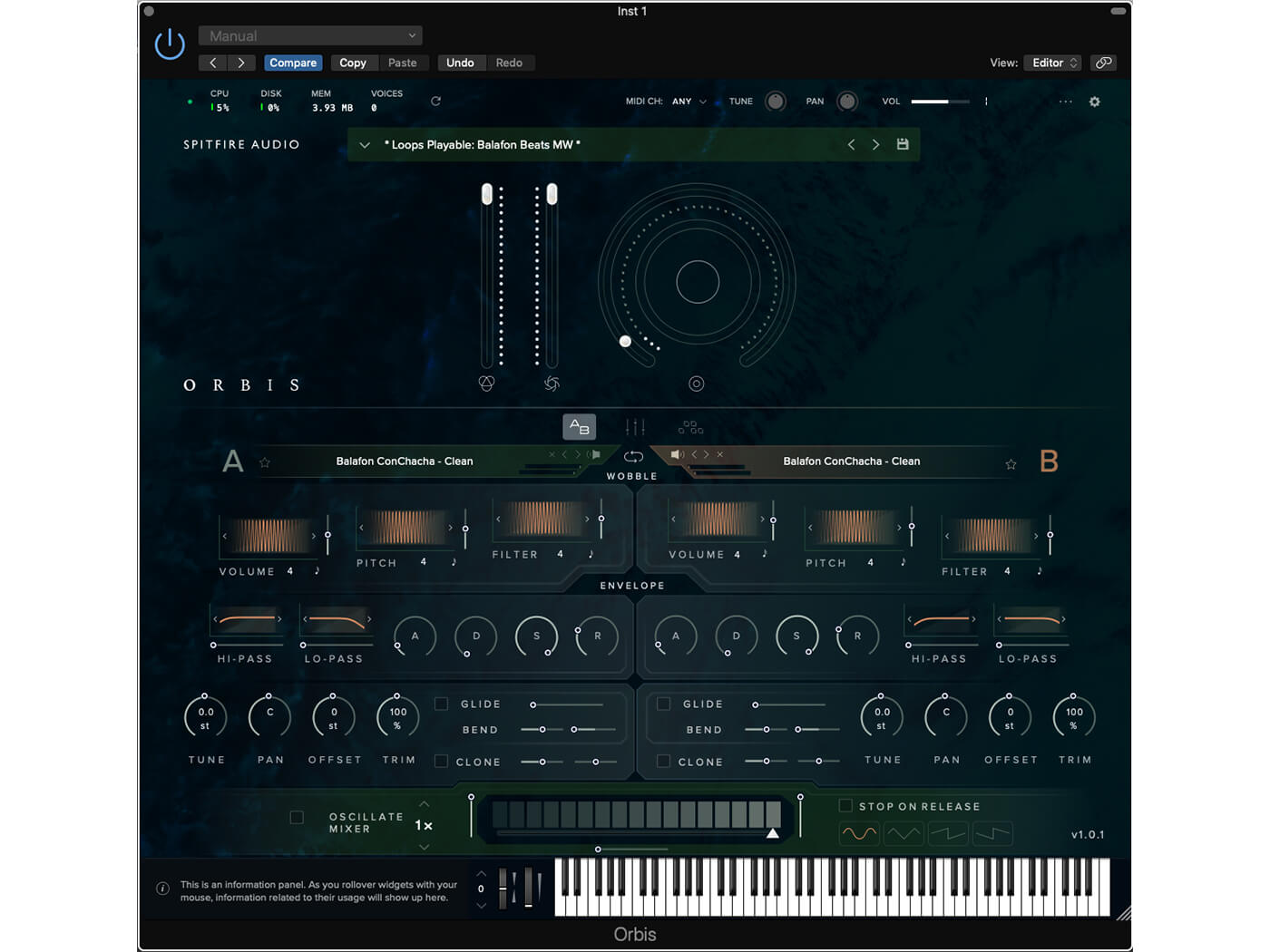

Price £299
Contact Spitfire Audio
Spitfire is never a company to sit on its laurels, with its extensive product line offering plenty for soundtrack composers and producers alike. Orbis is the latest addition, taking us out of the comfy studio environment and capturing unique instrumentation from around the world – packaged into a highly usable and versatile form that offers everything from basic sample playback to complete resynthesis.
The idea behind Orbis was first conceived by Spitfire co-founder Paul Thomson, upon the discovery of an extensive library of world sounds that had been recorded and collected by composer David Fanshawe over many years of extensive travels.
Rather than simply present these sounds in a rompler format, Spitfire sifted through hours of recordings, applying various effects-based treatments to the content, so much so that this makes up 90 per cent of Orbis’s raw material, alongside the healthy quotient of clean material. Consequently, there is a fine mixture of source material, with many playable and one-shot loops which snap to the tempo of your DAW, alongside a large element of sonic creation and design, much of which has been created from instruments which have rarely been heard, or have since ceased to exist.
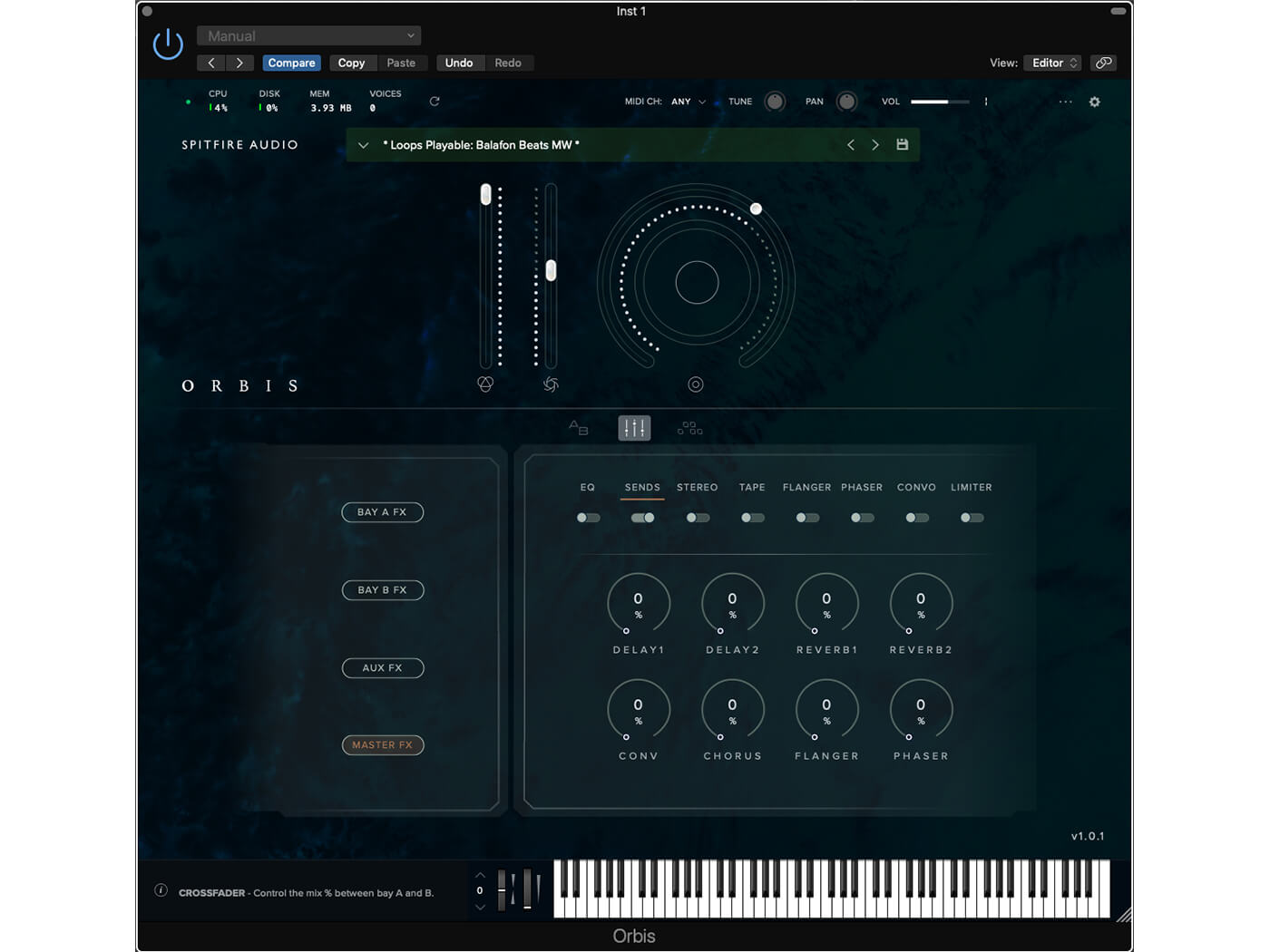
The world on a loop
An obvious place to begin with this library is with the loop-based content; loading initial presets from the top of the instrument pane, there’s a useful categorisation which breaks the presets down into both technical and musical menus. The technical category offers loops, pads and the like, while the more musical take on this concept offers adjectives such as ‘Natural’ or ‘Warped’, with the latter clearly being an example of where the source material has been mutated electronically.
The first thing that strikes me is the incredible audible quality. You find yourself clearly guessing which continent you are hearing, though some are incredibly obvious, such as the metallic strikes of some form of Chinese hammered dulcimer, which offers such clarity, it’s almost as though the performer is in the room with you. Within the loops there are also elements of performance, often with a sense of line to a given phrase which confirms the status of each world instrument.
We’re not confined to instruments though, as there are representations of vocal loops and chants as well. You feel an innate sense of privilege upon hearing these basic samples, such is the quality of this traditional music – and it becomes obvious that it is this purity of sound that defines Orbis.
Orbis the instrument
It takes quite a while to move beyond the preset content and there is no doubt that it gives a useful sense of the potential of the package. So it’s time to dive into the creative side, which is mostly represented in the lower segment of the instrument’s window.
Orbis offers two partials per voice, which are designated as partial A and B. These can be layered or exploited in such a way that one may cross-fade into the other, using the oscillator mixer, which is also rather usefully assigned to the modulation wheel. This makes for an easy, efficient and rather effective way of getting one partial to morph into another, while each partial offers an independent ADSR envelope, allowing another way of making a partial creep in, sustain or dissipate.
The oscillator mixer also has other tricks up its sleeve, which are reminiscent of other Spitfire products; nestling alongside are four LFO wave shapes, which can automate the mixer movement in sync, from a single 8th note up to several bars at a time. This is excellent for creating movement in patches, especially if morphing from a clean sound to one that is more distorted or coloured in its sonic makeup. This is something Spitfire plays with in some of its presets.
All the usual basic parameters are on parade within the A/B partial setup, such as tuning and panning, but there are also further interesting elements, such as sweepable filters, which can also be set to automate in time with the DAW.
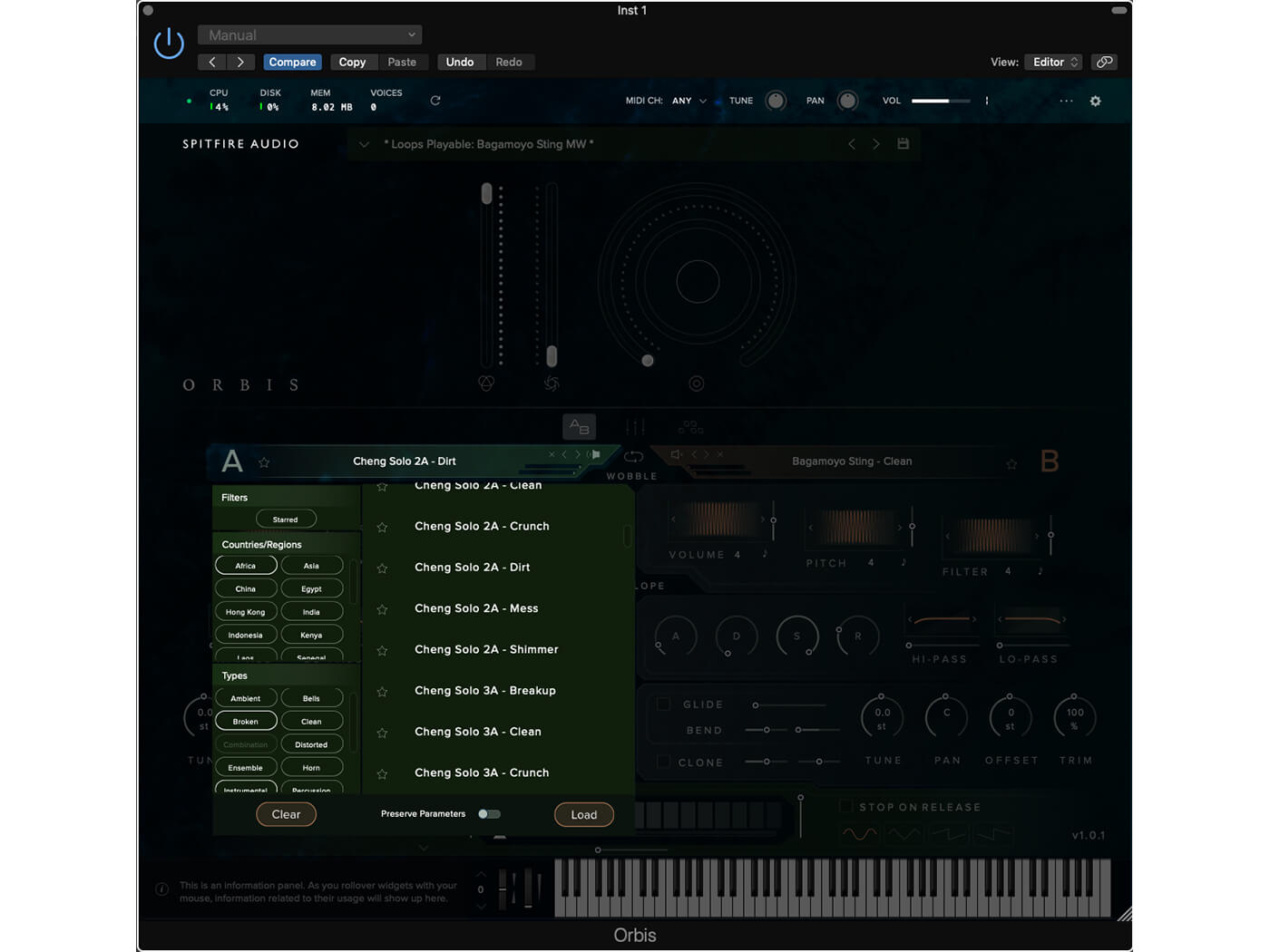
It’s partial time
I have to say that the area which excites me the most is the simplistic ability to load a partial from the astoundingly extensive set of included samples. There are literally hundreds of options here, which are helpfully categorised into countries or continents of origin. Each of these sampled elements are presented in various forms, from the beguiling beauty of the original to the numerous effected elements which have been passed through a number of colour-building palettes. The simple joy of blending together two basic partials to create a new patch is easy and satisfying, while the ability to explore the further editing elements just adds the icing to an already abundant cake.
Once those partials have been layered in the format of your choosing, you’ll find even more options in terms of filtering and effects. Moving to this area of the instrument removes the partial display in the lower half, quickly replacing it with the effects section. This also exists in a multi-layered form, while being very clear and concise in format.
The options here are numerous, with two sets of FX sends, which relate to Bay A and B, and additional Aux FX and a Master FX section. It’s almost as though Spitfire was worried that you might be missing out in the effects department, so all elements along the signal path have been catered for.
The more usual reverb, delay and modulation-style effects are shored up by some real gems! These vary from Bay A to Bay B, but one absolute beauty comes on the form of the formant and consonant filters. These play excellently together, picking out those harmonic elements in a truly organic way that’s a perfect match for the content at large.
The final raindance
Orbis is a multi-faceted instrument of great intrigue. I have to be honest and say that initially, I wasn’t entirely convinced, as I trawled through some of the presets. But like any good instrument, you dig a little deeper and find out what’s under the hood. The playback here is profoundly good. The freshness of the new Spitfire interface is worth noting in this setting, as it feels brilliantly thought-through, obvious when in use – and with plenty more functionality assignable to the main pot in the upper part of the screen.
What really had me hooked in was the comprehensive but easy to use editing features, which are simplicity itself to use, but unbelievably effective when it comes to the final output. Orbis is capable of loops, effected loops, crossfaded loops and all manner of pad-like ethereality, which I for one would have never expected, despite such a beautiful set of source samples.
Do I really need this?
The prospect of Orbis may not be to everyone’s taste; at its heart, there’s a huge number of really beautiful samples, but if you don’t want beauty you’re also in luck, because the numerous effected incarnations of each sample make for a comprehensive set which is truly interesting to explore.

Away from the more obvious acoustic samples, of which there is plenty of worldly diversity, the editing options are extensive and a joy to use – so much so, you’ll be missing a trick if you don’t explore this side of the plug-in to create interesting textures. If you want pads, this might not be your first choice, as it won’t be able to do as much as a more synth-based product; but what it will provide is organic movement of sound and samples, which is pretty unique and very cinematic.
Key features
- Huge library of incredibly rare world sounds
- Source material drawn from the extensive collection curated by composer, David Fanshawe
- Mixture of both playable and looped content
- 201 factory presets included, with further great potential for sonic creation
- Employs Spitfire’s own playback and instrument engine
- AU, VST and AAX plug-in formats available
- 18,450 samples included in library
- 21.1GB disk space required (22GB during installation)
Alternatives
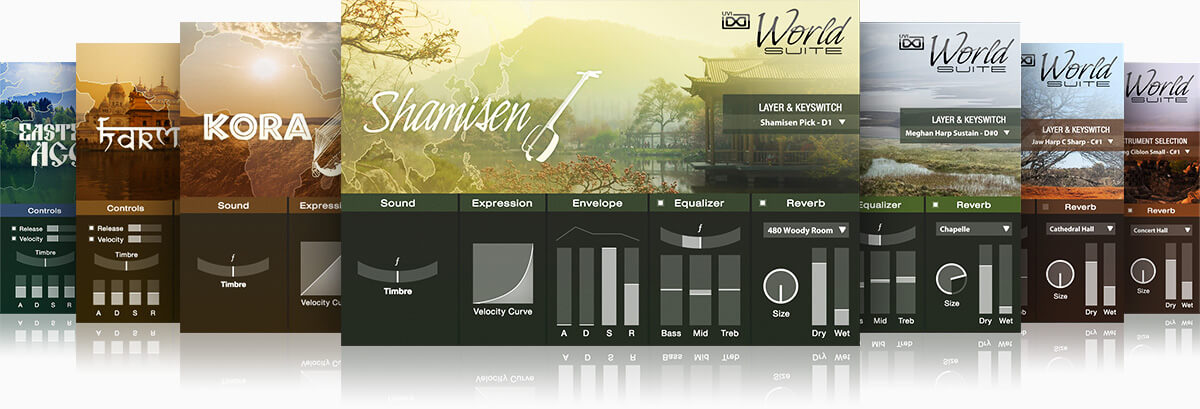
UVI
World Suite €299/£270/$330
World Suite is a very comprehensive collection of instruments from UVI, which includes playable instruments and loops drawn from all continents. It contains a huge library of content, with notable inclusions being Celtic and Jamaican instruments, while offering slightly different sound design potential to Orbis.
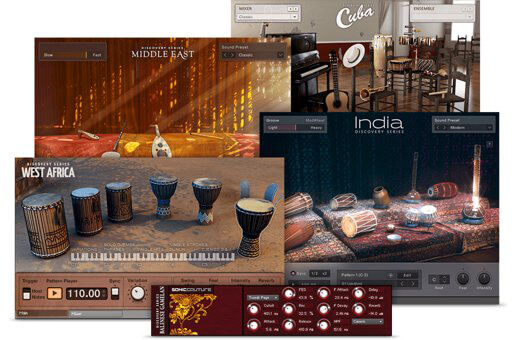
Native Instruments
Discovery Series £59-£169/$72-$210
Firmly within the Kontakt-player bracket, Native Instruments offers a number of world libraries which are available individually, or from within packages such as Komplete. They are designed more as playback samples, rather than a place to create new timbre, but are a very versatile and cost-effective option.